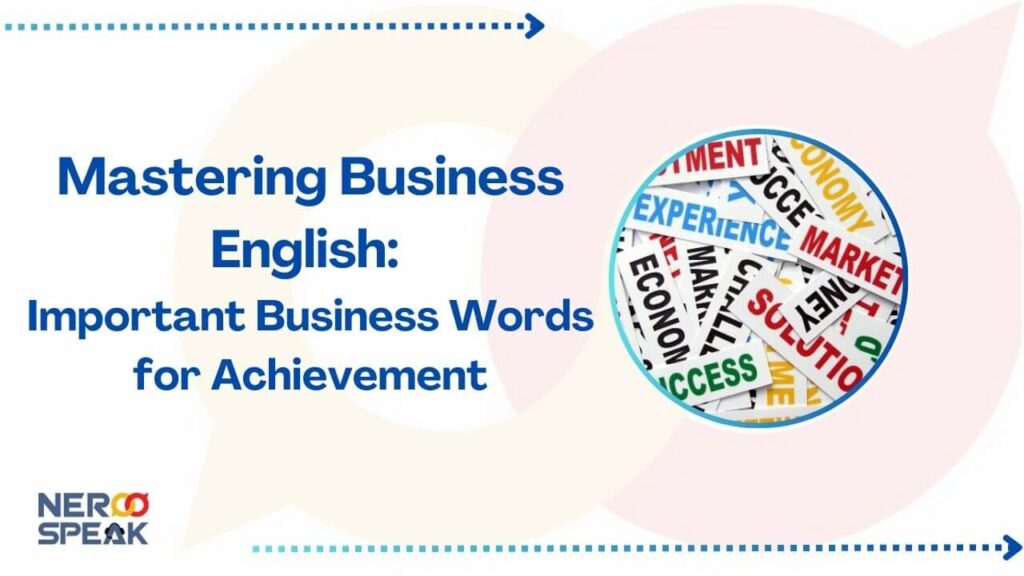In business, using the right words can help you succeed. Knowing important terms makes it easier for you to communicate. It also helps you feel sure in meetings, during negotiations, or when you write emails. It is vital to know the business language. This article will look at key business words that can help you talk clearly and well in any situation. Let’s discover how words can make a difference in the business world!

Core Business Words: Key Terms for Every Worker
To understand business vocabulary well, you need to start with basic terms. These terms explain how a company is set up and runs. Here is a list of key business terms that can help you speak clearly in any job setting.
1- Business Structure and Organization
- Corporation: A big company or a group of companies that can act as one.
- Startup: A new business that is often focused on technology and can grow quickly.
- CEO (Chief Executive Officer): The top executive in a company.
- CFO (Chief Financial Officer): The person in charge of handling the financial decisions of a company.
- Board of Directors: A group of people chosen to represent shareholders and help manage the company.
2- Business Functions
- Marketing: This is about promoting and selling products or services.
- Sales: This is the process of selling products or services.
- Human Resources (HR): This department takes care of hiring, training, and managing staff relations.
- Operations: These are the daily activities needed to run a business.
- Customer Service: This is the help given to customers before, during, and after they buy something.
3- Financial Terms
- Revenue: The total money a company makes from its business.
- Profit: The money a company keeps after all costs are taken away from revenue.
- Cash Flow: The flow of money in and out of a business.
- ROI (Return on Investment): A way to measure how much profit an investment makes.
Common Business Phrases: Improving Communication at Work
Knowing business vocabulary is not just about knowing single words. It is also about using the right phrases in the right situation. Here are some of the most common business words and phrases you will see in meetings, emails, and presentations.
1- Meetings and Presentations
- “Let’s talk”: A phrase to suggest a quick chat or check-in.
- “We need to come back to this”: A way to say that you’ll return to a topic at another time.
- “Let’s give others a chance to share”: Allowing people to share what they think.
- “Going ahead”: Talking about plans for what to do next.
2- Negotiations and Deals
- “Let’s reach an agreement”: This means both sides should agree on the terms.
- “We want a solution that helps both of us”: A way of negotiating where both sides gain something.
- “Let’s finish the deal”: This means to complete an agreement or contract.
- “We want a lasting partnership”: A statement that highlights continuous teamwork.
3- Emails and Correspondence
- “I hope this message finds you well”: A kind way to start any formal email.
- “Please let me know if you need more details”: Offering to provide extra information.
- “I look forward to your reply”: A usual closing line in emails.
- “Thanks for your quick attention”: Saying thank you for a fast response.
Business English Words for B2B Communication
When talking about business words in a B2B setting, the communication is usually more formal and planned. It is important to know the difference between B2B and B2C (business-to-consumer) communication styles. Here are some professional words for business in the B2B area:
B2B Communication Phrases
- “Let’s set up a follow-up meeting”: A nice way to propose more talks after an initial meeting.
- “We all agree on this”: Showing that we share the same view on business goals or plans.
- “We need to grow our reach”: Talking about ways to get a bigger market share or help our business.
- “Let’s start moving on this”: A prompt to take action and begin a project.
Knowing how to use these terms will help you talk well in B2B settings. In these places, it is important to build long-lasting, strategic relationships.
Navigating Business Culture with English
In addition to vocabulary, understanding business culture and its details is important for good communication. Knowing the right context for certain business words can help avoid misunderstandings, especially in global situations. The following words are about global business trends and cultural practices:
1- Cultural Sensitivity in Communication
- “Cross-cultural communication”: This means the sharing of information between people from different cultures.
- “Business etiquette”: These are the polite ways and norms that people follow in business situations.
- “Corporate social responsibility”: This is when a company tries to help with community goals.
- “Sustainability”: This practice keeps processes going without using up natural resources and helps the environment for a long time.
2- Global Business Trends
- “Digital transformation”: This means using digital technologies in every part of a business.
- “Innovation”: This refers to bringing in new ideas, ways, or products to solve business problems.
- “Disruption”: This is when innovation changes how industries or markets work in a big way.
Advanced Business Vocabulary: Mastering Difficult Ideas
For people who want to improve their communication skills, knowing some important business words is very helpful. These words often show up in planning meetings, talks about leadership, and important group discussions. Here’s a business vocabulary list to help understand difficult business ideas:
Strategic Business Terms
- SWOT analysis: A way to look at a company’s Strengths, Weaknesses, Opportunities, and Threats.
- PESTLE analysis: A tool to look at Political, Economic, Social, Technological, Legal, and Environmental factors.
- Market positioning: The way to define a brand or product’s identity compared to others.
- Advantage over competitors: The benefit a company has over others, often through special products or services.
Leadership and Management
- Delegation: This is when you give responsibility or power to someone else.
- Change management: This is about handling changes in a company’s goals, processes, or tools.
- Employee engagement: This is how much workers care about their organization and what it wants to achieve.
- Conflict resolution: This is how to settle differences in a professional way.
Building skills in Business English: Tips for doing well
Getting good at business vocabulary words takes time and practice. With regular effort, you can get better at talking in a professional way. Here are some tips to grow your business vocabulary and keep your communication skills strong:
- Daily Practice: Try to learn and use a new business word each day in your talks or writing.
- Use Flashcards: Make flashcards with 50 business words to help you remember them.
- Listen and Read: Read business news, listen to industry podcasts, or watch professional videos to learn office vocabulary and new terms.
- Join Discussions: Join business-related forums or networking events to practice using basic business words in real-life situations.
What is business word of the day?
The Business Word of the Day is a way to focus on one business term or phrase each day. It can help you grow your work-related vocabulary. A new word is shared daily, along with its meaning, an example, and how it connects to business. This supports professionals, students, and fans in building their business language and keeping up with the latest in the industry.
For example:
- Word of the Day: ROI (Return on Investment)
- Definition: A number used to check how much money you make from an investment. It is found by dividing the profit by the cost of the investment.
- We need to look at the return on investment for our new marketing plan. This will help us decide if we should keep it going.
- Relevance: ROI is important for checking how well a business is performing. It helps in making smart choices for future investments.
The Business Word of the Day can help you grow your business vocabulary. It does this in a simple and steady way.
In the end,
having a good grasp of business vocabulary is important for anyone who wants to do well in their job. Whether you are learning basic business words for daily talks or more advanced terms for serious discussions, growing your business English vocabulary will help you. With practice and the right phrases, you will understand industry-specific terms. This way, you can handle any business situation smoothly.
Expand your knowledge today by moving on to the following articles!
- All About Chief Business Officer (CBO)
- All About Customer Business Emoticon
- Best Online English Class Recommend
- Best Business English Certificate in 2025

Ali Mohammad is a SEO Specialist, Content Writer, and WEB Developer with over 4 years of experience in WEB. He has a strong background in Content Writing gained through SEO Companies. He holds a Master Degree in Communications Engineering from Tishreen University and is a certified professional. Ali is passionate about Business and Engineering and enjoys helping readers by sharing his knowledge.